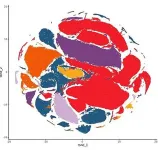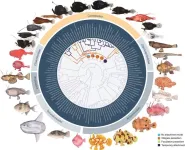(Press-News.org) New Haven, Conn. – A new analysis has revealed detailed information about genetic variation in brain cells that could open new avenues for the targeted treatment of diseases such as schizophrenia and Alzheimer’s disease.
The findings, reported May 23 in Science, were the result of a multi-institutional collaboration known as PsychENCODE, founded in 2015 by the National Institutes of Health, which seeks new understandings of genomic influences on neuropsychiatric disease. The study was published alongside related studies in Science, Science Advances, and Science Translational Medicine.
Previous research has established a strong link between a person’s genetics and their likelihood of developing neuropsychiatric disease, says Mark Gerstein, the Albert L. Williams Professor of Biomedical Informatics at Yale School of Medicine and senior author of the new study.
“The correlations between genetics and your susceptibility to disease are much higher for brain diseases than for cancer or heart disease,” said Gerstein. “If your parents have schizophrenia, you’re much more likely to get it than you are to get heart disease if your parents have the disease. There is a very large heritability for these brain-related conditions.”
What’s less clear, however, is how this genetic variation leads to disease.
"We want to understand the mechanism,” said Gerstein. “What is that gene variant doing in the brain?”
For the new study, researchers set out to better understand the genetic variation across individual cell types in the brain. To do so, they performed several types of single-cell experiments on more than 2.8 million cells taken from the brains of 388 people, including healthy individuals and others with schizophrenia, bipolar disorder, autism spectrum disorder, post-traumatic stress disorder, and Alzheimer’s disease.
From that pool of cells, the researchers identified 28 different cell types. Then they examined gene expression and regulation within those cell types.
In one analysis, the researchers were able to link gene expression to variants in “upstream” regulatory regions, bits of genetic code situated before the gene in question that can increase or decrease the gene’s expression.
"That’s useful because if you have a variant of interest, you can now link it to a gene,” said Gerstein. “And that’s really powerful because it helps you interpret the variants. It helps you understand what effect they’re having in the brain. And because we looked across cell types, our data also allow you to connect that variant to an individual cell type of action.”
The researchers also assessed how particular genes, such as those associated with neurotransmitters, varied across individuals and cell types, finding variability was usually higher across cell types than across individuals. This pattern was even stronger for genes that code for proteins targeted for drug treatment.
"And that’s generally good for a drug,” Gerstein said. “It means that those drugs are homing in on particular cell types and not affecting your whole brain or body. It also means those drugs are more likely to be unaffected by genetic variants and work in many people.”
Using the data generated by the analysis, the researchers were able to map out within-cell type genetic regulatory networks and between-cell communication networks, and then plug those networks into a machine learning model. Then, using an individual’s genetic information, the model could predict whether they had a brain disease.
"Because these networks were hard coded in the model, when the model made a prediction we could see which parts of the network contributed to it,” said Gerstein. “So we could identify which genes and cell types were important for that prediction. And that can suggest candidate drug targets.”
In one example, the model predicted an individual with a particular genetic variant might have bipolar disorder, and the researchers could see that prediction was based on two genes in three cell types. In another, the researchers identified six genes in six cell types that contributed to a schizophrenia prediction.
The model also worked in the opposite direction. The researchers could introduce a genetic perturbation and see how that might affect the network and an individual’s health. This, Gerstein says, is useful for drug design or previewing how well drugs or drug combinations might fare as treatments.
Together, the findings could help facilitate precision-medicine approaches for neuropsychiatric disease, said the researchers.
To further this work, the consortium has made its results and model available to other researchers.
“Our vision is that researchers interested in a particular gene or variant can use our resources to better understand what it’s doing in the brain or to perhaps identify new candidate drug targets to investigate more,” said Gerstein.
END
Tracking the cellular and genetic roots of neuropsychiatric disease
2024-05-23
ELSE PRESS RELEASES FROM THIS DATE:
Pioneering new study uncovers insights into PTSD & major depressive disorder
2024-05-23
AUSTIN, Texas — Stress-related disorders like post-traumatic stress disorder and clinical depression are complex conditions influenced by both genetics and our environment. Despite significant research, the molecular mechanisms behind these disorders have remained elusive. However, researchers at Dell Medical School at The University of Texas at Austin have broken new ground with a study that sheds light on the intricate differences occurring in the brains of people with PTSD and depression compared to neurotypical controls. The study, published this week in Science, could provide potential avenues for novel therapeutics and biomarkers.
“Understanding why some people develop ...
Two new studies by Mount Sinai researchers in science offer key insights into the origins and potential treatment of mental health disorders
2024-05-23
Working under the umbrella of the PsychENCODE Consortium, the mental health research project established in 2015 by the National Institutes of Health, a team of Mount Sinai scientists has uncovered important new insights into the molecular biology of neuropsychiatric disease through two new studies published in a special issue of Science on Friday, May 24. These investigations, conducted with colleagues from other major research centers, involve the largest single-cell analysis to date of the brains of people with schizophrenia, and a first-of-its-kind ...
Sequencing of the developing human brain uncovers hundreds of thousands of new gene transcripts
2024-05-23
A team led by researchers at UCLA and the University of Pennsylvania has produced a first-of-its kind catalog of gene-isoform variation in the developing human brain. This novel dataset provides crucial insights into the molecular basis of neurodevelopmental and psychiatric brain disorders and paves the way for targeted therapies.
The research, published in Science, also details how transcript expression varies by cell type and maturity, finding that changing gene-isoform expression levels can help ...
Carnegie Mellon University researchers to tackle carbon use, sustainability through NSF expeditions in computing awards
2024-05-23
Researchers from Carnegie Mellon University's School of Computer Science will contribute to two multi-institution research initiatives aimed at reducing the use of carbon and creating sustainable computing.
The projects recently received funding through the U.S. National Science Foundation's (NSF) Expeditions in Computing Awards program, which is providing $36 million to three projects selected for their potential to revolutionize computing and make significant impacts toward reducing the carbon footprint of the lifecycle of computers. The ...
USDA-NIFA grant supports microwave tech to zap weed seeds
2024-05-23
By John Lovett
University of Arkansas System Division of Agriculture
FAYETTEVILLE, Ark. — It’s not just for burritos and popcorn. Microwave technology is also being tested as a new tool to destroy weed seeds and decrease herbicide use.
Scientists and engineers with the Arkansas Agricultural Experiment Station are investigating the use of 915 MHz microwaves to neutralize a variety of weed seeds underground. The study is supported by a nearly $300,000 Agriculture and Food Research Initiative grant from the U.S. Department of Agriculture’s National Institute of Food and Agriculture, with additional support ...
Research spotlight: AI enabled body composition analysis predicts outcomes for patients with lung cancer treated with immunotherapy
2024-05-23
Tafadzwa Chaunzwa, MD, a researcher in the Artificial Intelligence in Medicine (AIM) Program at Mass General Brigham and a senior resident physician at the Harvard Radiation Oncology Program, is the lead author of a paper published in JAMA Oncology. Chaunzwa and senior author Hugo Aerts, PhD, director of the AIM Program, and associate professor at Harvard University, shared highlights from their paper.
How would you summarize your study for a lay audience?
As treatments like immunotherapy improve cancer survival rates, there is a growing need for clinical decision-support tools that predict treatment response ...
Silky shark makes record breaking migration
2024-05-23
In a recent study, researchers from the Charles Darwin Foundation (CDF), in collaboration with the Guy Harvey Research Institute (GHRI) and Save Our Seas Foundation Shark Research Center (SOSF-SRC) at Nova Southeastern University in Florida, and the Galapagos National Park Directorate (GNPD) have documented the most extensive migration ever recorded for a silky shark (Carcharhinus falciformis), revealing critical insights into the behavior of this severely overfished species and emphasizing the urgent need for cooperative international management measures to prevent further population declines.
The ...
Sexual parasitism helped anglerfish invade the deep sea during a time of global warming
2024-05-23
Members of the vertebrate group including anglerfishes are unique in possessing a characteristic known as sexual parasitism, in which males temporarily attach or permanently fuse with females to mate. Now, researchers reporting in the journal Current Biology on May 23 show that sexual parasitism arose during a time of major global warming and rapid transition for anglerfishes from the ocean floor to the deep, open sea.
The findings have implications for understanding evolution and the effects that global warming may have in the deep sea, according to the researchers.
“Our results show how the ...
Archaeology: Differences in Neanderthal and Palaeolithic human childhood stress
2024-05-23
Neanderthal children (who lived between 400,000 and 40,000 years ago) and modern human children living during the Upper Palaeolithic era (between 50,000 and 12,000 years ago) may have faced similar levels of childhood stress but at different developmental stages, according to a study published in Scientific Reports. The authors suggest that these findings could reflect differences in childcare and other behavioural strategies between the two species.
Laura Limmer, Sireen El Zaatari and colleagues analysed the dental enamel of 423 Neanderthal teeth (from 74 Homo neanderthalensis individuals) and 444 Upper Palaeolithic humans (from 102 Homo sapiens ...
Rising temperatures will significantly reduce streamflow in the upper Colorado river basin as groundwater levels fall, new research shows
2024-05-23
The Colorado River makes life possible in many Western cities and supports agriculture that sustains people throughout the country. Most of the river’s water begins as snowmelt from the mountainous watersheds of Colorado, Utah, and Wyoming, and a warming climate will drastically reduce these streamflows, new research finds.
Researchers from Desert Research Institute (DRI), USGS, and Lawrence Berkeley National Laboratory teamed up for the new study, published May 23 in Nature Water. By applying warming to historical conditions for the East River in Colorado and using computer simulations to observe the impact on streamflow and groundwater ...






